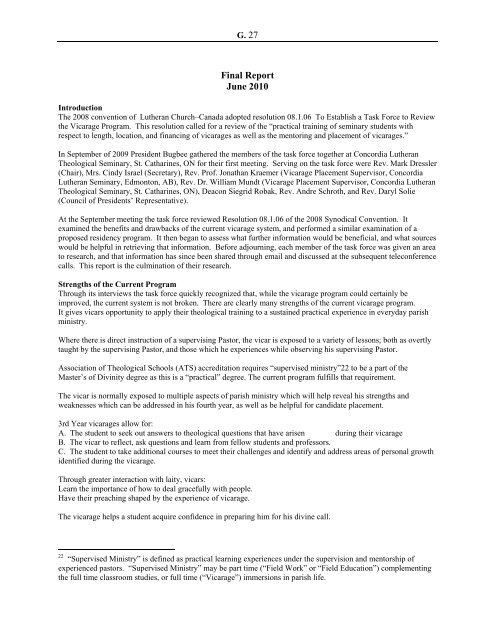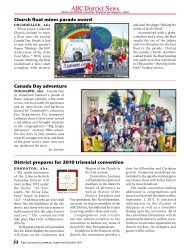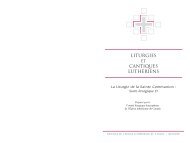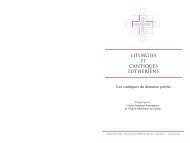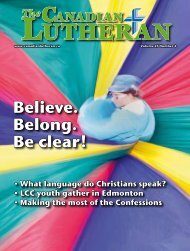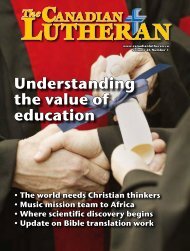Planned Giving Gift Summary - Lutheran Church-Canada
Planned Giving Gift Summary - Lutheran Church-Canada
Planned Giving Gift Summary - Lutheran Church-Canada
You also want an ePaper? Increase the reach of your titles
YUMPU automatically turns print PDFs into web optimized ePapers that Google loves.
G. 27<br />
Final Report<br />
June 2010<br />
Introduction<br />
The 2008 convention of <strong>Lutheran</strong> <strong>Church</strong>–<strong>Canada</strong> adopted resolution 08.1.06 To Establish a Task Force to Review<br />
the Vicarage Program. This resolution called for a review of the “practical training of seminary students with<br />
respect to length, location, and financing of vicarages as well as the mentoring and placement of vicarages.”<br />
In September of 2009 President Bugbee gathered the members of the task force together at Concordia <strong>Lutheran</strong><br />
Theological Seminary, St. Catharines, ON for their first meeting. Serving on the task force were Rev. Mark Dressler<br />
(Chair), Mrs. Cindy Israel (Secretary), Rev. Prof. Jonathan Kraemer (Vicarage Placement Supervisor, Concordia<br />
<strong>Lutheran</strong> Seminary, Edmonton, AB), Rev. Dr. William Mundt (Vicarage Placement Supervisor, Concordia <strong>Lutheran</strong><br />
Theological Seminary, St. Catharines, ON), Deacon Siegrid Robak, Rev. Andre Schroth, and Rev. Daryl Solie<br />
(Council of Presidents’ Representative).<br />
At the September meeting the task force reviewed Resolution 08.1.06 of the 2008 Synodical Convention. It<br />
examined the benefits and drawbacks of the current vicarage system, and performed a similar examination of a<br />
proposed residency program. It then began to assess what further information would be beneficial, and what sources<br />
would be helpful in retrieving that information. Before adjourning, each member of the task force was given an area<br />
to research, and that information has since been shared through email and discussed at the subsequent teleconference<br />
calls. This report is the culmination of their research.<br />
Strengths of the Current Program<br />
Through its interviews the task force quickly recognized that, while the vicarage program could certainly be<br />
improved, the current system is not broken. There are clearly many strengths of the current vicarage program.<br />
It gives vicars opportunity to apply their theological training to a sustained practical experience in everyday parish<br />
ministry.<br />
Where there is direct instruction of a supervising Pastor, the vicar is exposed to a variety of lessons; both as overtly<br />
taught by the supervising Pastor, and those which he experiences while observing his supervising Pastor.<br />
Association of Theological Schools (ATS) accreditation requires “supervised ministry”22 to be a part of the<br />
Master’s of Divinity degree as this is a “practical” degree. The current program fulfills that requirement.<br />
The vicar is normally exposed to multiple aspects of parish ministry which will help reveal his strengths and<br />
weaknesses which can be addressed in his fourth year, as well as be helpful for candidate placement.<br />
3rd Year vicarages allow for:<br />
A. The student to seek out answers to theological questions that have arisen during their vicarage<br />
B. The vicar to reflect, ask questions and learn from fellow students and professors.<br />
C. The student to take additional courses to meet their challenges and identify and address areas of personal growth<br />
identified during the vicarage.<br />
Through greater interaction with laity, vicars:<br />
Learn the importance of how to deal gracefully with people.<br />
Have their preaching shaped by the experience of vicarage.<br />
The vicarage helps a student acquire confidence in preparing him for his divine call.<br />
22 “Supervised Ministry” is defined as practical learning experiences under the supervision and mentorship of<br />
experienced pastors. “Supervised Ministry” may be part time (“Field Work” or “Field Education”) complementing<br />
the full time classroom studies, or full time (“Vicarage”) immersions in parish life.


